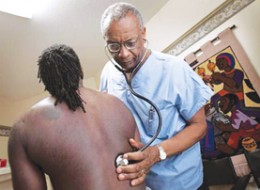 The government says the number of Americans without health insurance is now nearly 47 million, up 7 percent from 2006. With unemployment remaining at an all-time high, one in five people say they have put off medical care for conditions like high blood pressure, diabetes, and HIV-AIDS.
The government says the number of Americans without health insurance is now nearly 47 million, up 7 percent from 2006. With unemployment remaining at an all-time high, one in five people say they have put off medical care for conditions like high blood pressure, diabetes, and HIV-AIDS.
Looking to save money in a weak economy, Americans increasingly are skipping routine medical care. The Centers for Disease Control and Prevention issued a report recently on the uninsured based on tens of thousands of in-person interviews for the years 2006 through 2010.
Thirty-nine percent of people polled said they had postponed a visit to the doctor, while 16 percent had declined a medical test because of cost. Thirty-seven percent said they skipped a dose of medicine to save money or skipped filling a prescription because of the expense.
This trend is expected to continue as the burden of care continues to be shifted to the individual and more Americans lose their jobs and their health insurance, said Dr. Temetry Lindsey, President and CEO of Inland Behavioral Services (IBS) in San Bernardino.
"This is a very worrisome trend," said Lindsey. "We're now starting to see the impact of the recession on the working middle class. People are skipping doctors' visits or doses of medicine. It's not only about mammograms and colonoscopies; people are putting off getting care for serious conditions that do not produce pain or symptoms until it's too late.
"We live in a culture that bashes government becoming more involved in healthcare, but forgets that many of our current health insurance systems and medical care options have gotten out of reach," said Lindsey, who added the trend is particularly troubling for Los Angeles' Inland Empire's at risk populations already reeling from years of poverty.
The very poor are generally covered by government programs such as Med-Cal. Meanwhile, the underinsured are opting for risky cost cutting alternatives and higher insurance deductibles. She said many of the regions underinsured don't take advantage of safer alternatives such as federally funded health clinics that offer services at reduced cost. "People are surprised when they come in to our clinics and learn that we offer quality health services for diabetes, high blood pressure, asthma, cancer screenings, and other health services, for in some cases up to 50 percent less than the cost of a doctor's appointment," said Lindsey.
She cited the case of a patient who put off treatment for a tooth ached for several months until his pain became unbearable.
"Our dentist filled a gaping hole in one of his lower molars. The entire treatment including x-rays and exam cost $50." Lindsey said more than half of her clinic's dental patients are adults. The clinic provides dental care on a sliding scale starting around $35.
Lindsey says statistically some patients will have a fatal disease that could have been prevented.
"That is a tragedy that I've spent my entire career trying to prevent. People are hurting, they're scared. We all have to do a better job of putting the word out that there are cost effective alternatives. That's my priority now," she said. "It will be interesting to see what happens in 2014 when the individual mandates requiring Americans to purchase healthcare kick in."
- Home
- News
- Opinion
- Entertainment
- Classified
- About Us
 MLK Breakfast
MLK Breakfast- Community
- Foundation
- Obituaries
- Donate
04-19-2024 6:57 pm • PDX and SEA Weather






















































































































































































































































































































